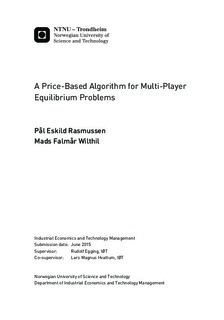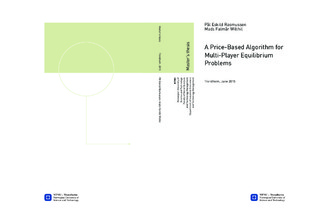| dc.description.abstract | This thesis is about improving the solution time for energy market equilibrium models. Equilibrium models have seen an increased usage over the last years, and the models used for numerical analysis are growing larger and more complex. The computational solvers used to solve equilibrium problems are made for a larger class of mathematical problems and thus we believe it is possible to create more specialized algorithms that solves energy market equilibrium models faster.
A deterministic energy market equilibrium model is presented, with supplier, consumers and transmission system operators. The supplier are modelled as Cournot-players who are able to exert market power. To solve the equilibrium problem the equilibrium model is decomposed into individual and independent single-firm optimization problems with exogenous market prices. We show two different decompositions, varying in how the commodity is routed between supply and demand nodes. Both decompositions are able to keep the suppliers as Cournot-players despite their price-taking behaviour.
To solve the decomposed equilibrium model we present an iterative algorithm which searches through market prices. By acquiring the optimal decisions of the actors given one set of prices we are able to deduce how the prices should change in the next iteration. We present three different algorithm alternatives, one of which has strict requirements on the properties of the equilibrium solution to converge. The other two alternatives are more robust, but solves a computational expensive traffic equilibrium problem in each iteration.
The developed algorithm is tested and compared to the commercial solver PATH.
None of the developed alternatives achieve better solution times than PATH during testing, but evidence suggests there is room for performance improvement through a more efficient handling of the traffic equilibrium problem and a more holistic search strategy. We believe that with further development a price-based algorithm can help reduce solution times of energy market equilibrium and solve models previously restricted by insurmountable solution times. | |

